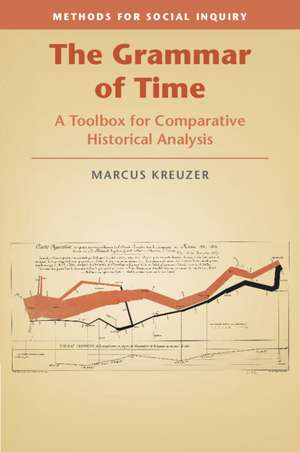The Grammar of Time: A Toolbox for Comparative Historical Analysis: Methods for Social Inquiry
Autor Marcus Kreuzeren Limba Engleză Paperback – 24 mai 2023
| Toate formatele și edițiile | Preț | Express |
|---|---|---|
| Paperback (1) | 184.05 lei 6-8 săpt. | |
| Cambridge University Press – 24 mai 2023 | 184.05 lei 6-8 săpt. | |
| Hardback (1) | 524.98 lei 6-8 săpt. | |
| Cambridge University Press – 24 mai 2023 | 524.98 lei 6-8 săpt. |
Preț: 184.05 lei
Nou
Puncte Express: 276
Preț estimativ în valută:
35.22€ • 36.77$ • 29.15£
35.22€ • 36.77$ • 29.15£
Carte tipărită la comandă
Livrare economică 04-18 aprilie
Preluare comenzi: 021 569.72.76
Specificații
ISBN-13: 9781108718233
ISBN-10: 110871823X
Pagini: 180
Dimensiuni: 152 x 229 x 12 mm
Greutate: 0.31 kg
Editura: Cambridge University Press
Colecția Cambridge University Press
Seria Methods for Social Inquiry
Locul publicării:Cambridge, United Kingdom
ISBN-10: 110871823X
Pagini: 180
Dimensiuni: 152 x 229 x 12 mm
Greutate: 0.31 kg
Editura: Cambridge University Press
Colecția Cambridge University Press
Seria Methods for Social Inquiry
Locul publicării:Cambridge, United Kingdom
Cuprins
Introduction: how to study a disorderly world in an orderly fashion; Section I. The Temporal foundations of comparative historical analysis; 1. Historical thinking: stop talking about testing for once!; 2. Varieties of historical time: history is not a dummy variable; 3. Physical time: capturing the rhythms of history; Section II. How to use history to describe patterns; 4. A primer on the origins of electoral systems; 5. Eventful analysis: using dates to explore patterns of (dis-) continuities; 6. Longue Durée analysis: looking for serial patterns; 7. Macro-causal analysis: physical time and the temporal construction of theories; Section III. What about causality?; 8. situating comparative historical analysis: heterodox yet still systematic; 9. Historical explanations: making sense of continuities and discontinuities; 10. Causal process tracing: making testing symmetric; Conclusion: different origins and shared complementarities.
Recenzii
'Testing theories with historical data has become increasingly popular among social scientists. Often, however, history is 'used' uncritically, after stripping social and political phenomena of their spatial and temporal context, or by forcing monocausal models on complex and distant realities. Kreuzer's impressive volume offers a very persuasive warning against such strategies and proposes a conceptual apparatus to use history consciously in the social sciences. Written in a very accessible language, this book should be required reading for all graduate students and social scientists who plan to engage with history.' Giovanni Capoccia, Professor of Comparative Politics, University of Oxford
'Kreuzer reminds us that doing history is much more than mining data from a more or less remote past to test our hypotheses or establish some causal effect. He offers us a nuanced and thorough guide for how to go about it and, in doing so, he widens our horizons and improves our research.' Stathis N. Kalyvas, Gladstone Professor of Government, University of Oxford
'Kreuzer reminds us that doing history is much more than mining data from a more or less remote past to test our hypotheses or establish some causal effect. He offers us a nuanced and thorough guide for how to go about it and, in doing so, he widens our horizons and improves our research.' Stathis N. Kalyvas, Gladstone Professor of Government, University of Oxford
Notă biografică
Descriere
The first systematic guide to the tools researchers employ to explore and answer broad macro-historical questions in the social sciences.





